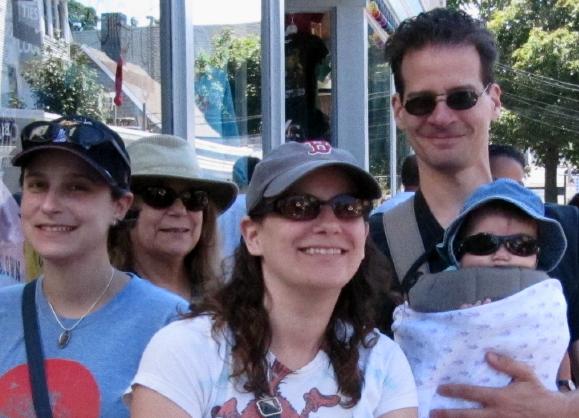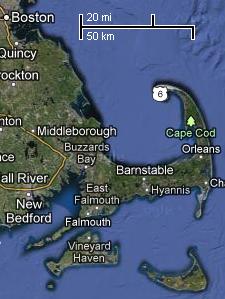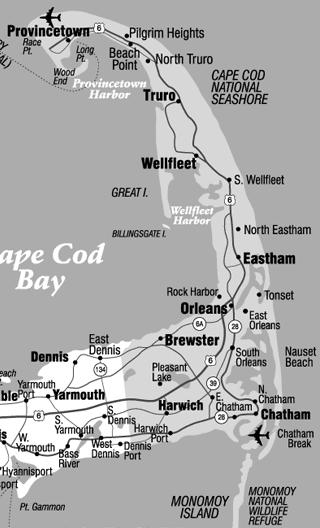
In those days, travelers carried cash in the form of traveler's checks. These were checks made out in specific amounts, purchased in advance, with two signature lines. The first of these was signed at the bank when the checks were purchased, and the second was signed when the check was used. The restaurant or store receiving the check could compare the two signatures, thereby verifying that the check was really being used by its proper owner. There were various suppliers of these checks, but one of the most often used was "American Express". These days, we don't use traveler's checks anymore. Rather, we use ATMs ("Automated Teller Machines") to obtain any local currency that's needed. These are widely available in most countries that are visited by tourists. But ATMs didn't exist in the 70s. In any visit to the Cape, one spends at least a day in the picturesque village of Provincetown, at the Cape's northern tip. Towards the end of the day, I realized that I had lost my traveler's checks somewhere. Of course, that's exactly the advantage of carrying traveler's checks as opposed to carrying cash. If lost or stolen, traveler's checks can be replaced. In theory, a thief can't use the checks, because he can't reproduce the signature. In any event, the supplier of the checks, in this case American Express, takes on that risk. So, using a public telephone on the Provincetown pier, I telephoned American Express (there were no cell phones in those days, just as there were no ATMs). I explained my problem, and told them the serial numbers of the lost checks (users of traveler's checks were always instructed to keep a record of these serial numbers, in a place apart from the checks themselves). American Express assured me that they would replace the checks. This would be done by sending me to one of the banks that normally sells their checks, which American Express would instruct to provide me with replacements. The representative asked me where I was, and I told him I was in Provincetown, Massachusetts.
At the time, I wasn't very familiar with Cape Cod (I know a lot more about it now). So I told the rep that I didn't know the names of many nearby towns, and my map of the Cape was back in the car. Even the small map to the right would have helped (the part of the Cape that sticks up to the north is called the "Outer Cape"). "What's 'Cape Cod'?", the rep asked. "Is that a town". "No," I said "It's a region. Don't you have a map?" "No," he said, "All I've got is an alphabetical list of those towns in Massachusetts where we have affiliated banks." He was somewhere in the middle of the United States (I vaguely recall that he might have been in Utah). I suggested to him that since people calling for traveler's check replacement were probably unfamiliar with the areas they were visiting, it would've been really beneficial for American Express to provide its reps with state maps, perhaps by giving each an atlas. Wracking my brain, I was able to come up with a few town names. There was Eastham, where we were staying. I don't remember what the others were - possibly nearby Truro, or the much farther Hyannis. I eventually mentioned the name of another town we had passed through on the way from Eastham to Provincetown: Wellfleet. At that the rep said, "Oh I've got that one. You can pick up your replacement checks at a bank there." He gave me a phone number with which to call the bank, and told me he would set up the transaction so that I could pick up the checks the next day. I phoned the bank to arrange for the pickup. But when they described how to find the bank, it suddenly became clear that the bank was not in Wellfleet at all. Rather, it was in Wellesley, Massachusetts, a town in the Boston area, actually not all that far from our home in Wayland. The American Express representative, hearing "Wellfleet" and scanning his alphabetical list, had hit upon "Wellesley", and thought that's what I had said. That was an entirely useless place to pick up the traveler's checks. Indeed, discovering that the bank was in Wellesley made sense of something that had been vaguely gnawing at the back of my brain since the rep had given me the bank's phone number - there was something familiar about it. The telephone exchange was "235". Wellesley being not that far from where I lived, I really should have immediately recognized 235 as a Wellesley exchange, but I hadn't made the connection. One of the places we had visited in Provincetown was the Coit Tower, a Provincetown landmark. Margie and I decided that it was the most likely place where I might have dropped the checks, so we decided to go back there and ask. And sure enough, they had found my checks, and they returned them to me. So the entire exercise in replacing them turned out to be unnecessary. Except, of course, the very first step of the process had been to void that set of checks preparatory to having them replaced. I called American Express back, and explained the situation. They told me they could reactivate my checks, but it would take a day before I could start using them. They would also rescind the order to have new checks available to me in Wellesley. So in the end, everything worked out, but I was rather unimpressed by American Express's inability to effectively help me find a pickup point. This event was the second in my life that touched upon the town of Wellfleet. The first was reported in my blog entry Night race, in which I told of an overnight sailboat race which rounded a silent, unlighted buoy off Billingsgate Shoal, just to the west of Wellfleet Harbor. Obviously, on that occasion we had never visited the town itself. We're now much more familiar with the Cape in general, and the town of Wellfleet in particular. This is because some former neighbors and good friends of ours sold their Wayland home, and now live in Wellfleet, although south of the town center, and we visit them from time to time. Also, since the events described above, two daughters, a son-in-law, and a granddaughter have been added to my family, and we just spent a week-long family vacation in Wellfleet. We chose to stay in the town center, where we rented a house for a week. This allowed us to walk to many events in the town, and avoid the rather nasty summer traffic on Route 6. But we did, of course, drive up to Provincetown for a day. Here's a picture of the family (minus me, since I took the picture) walking down Commercial Street:    |

